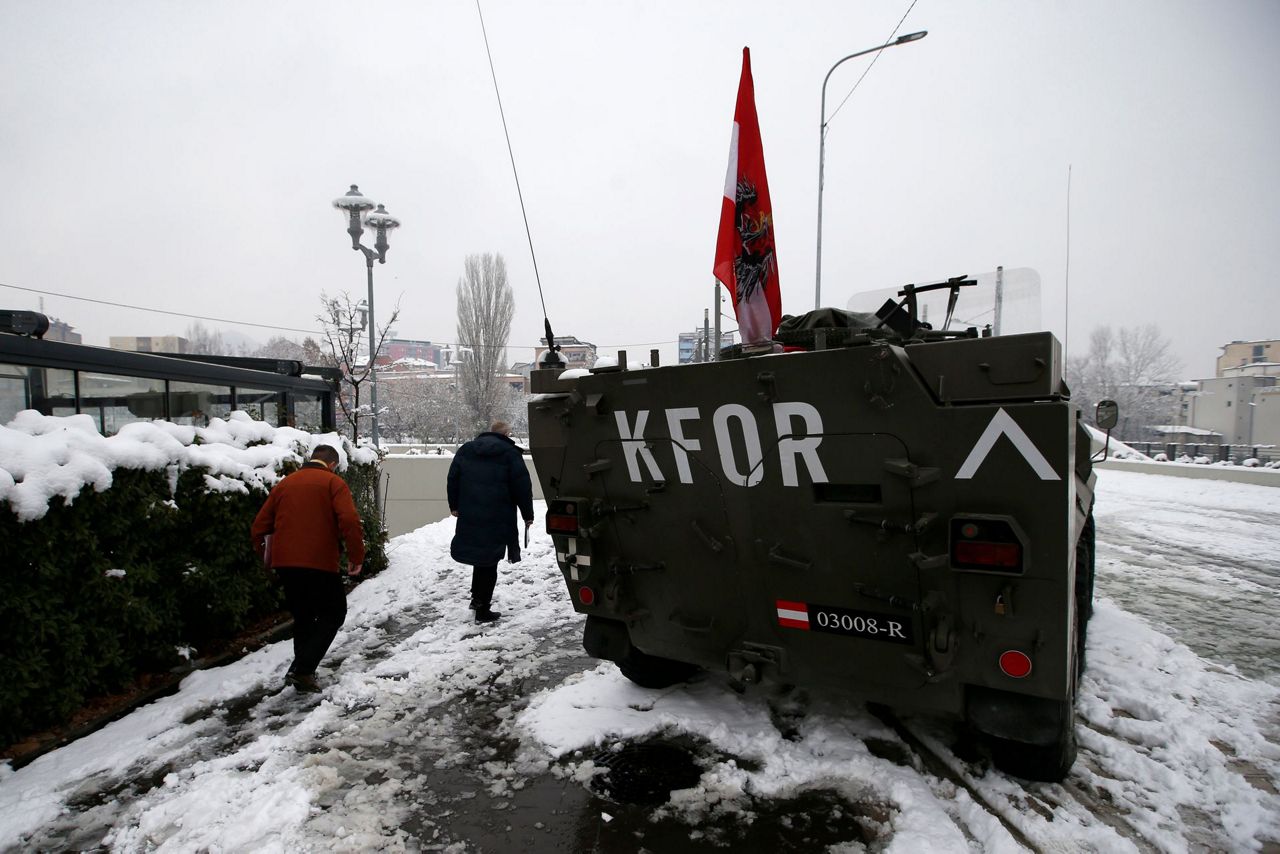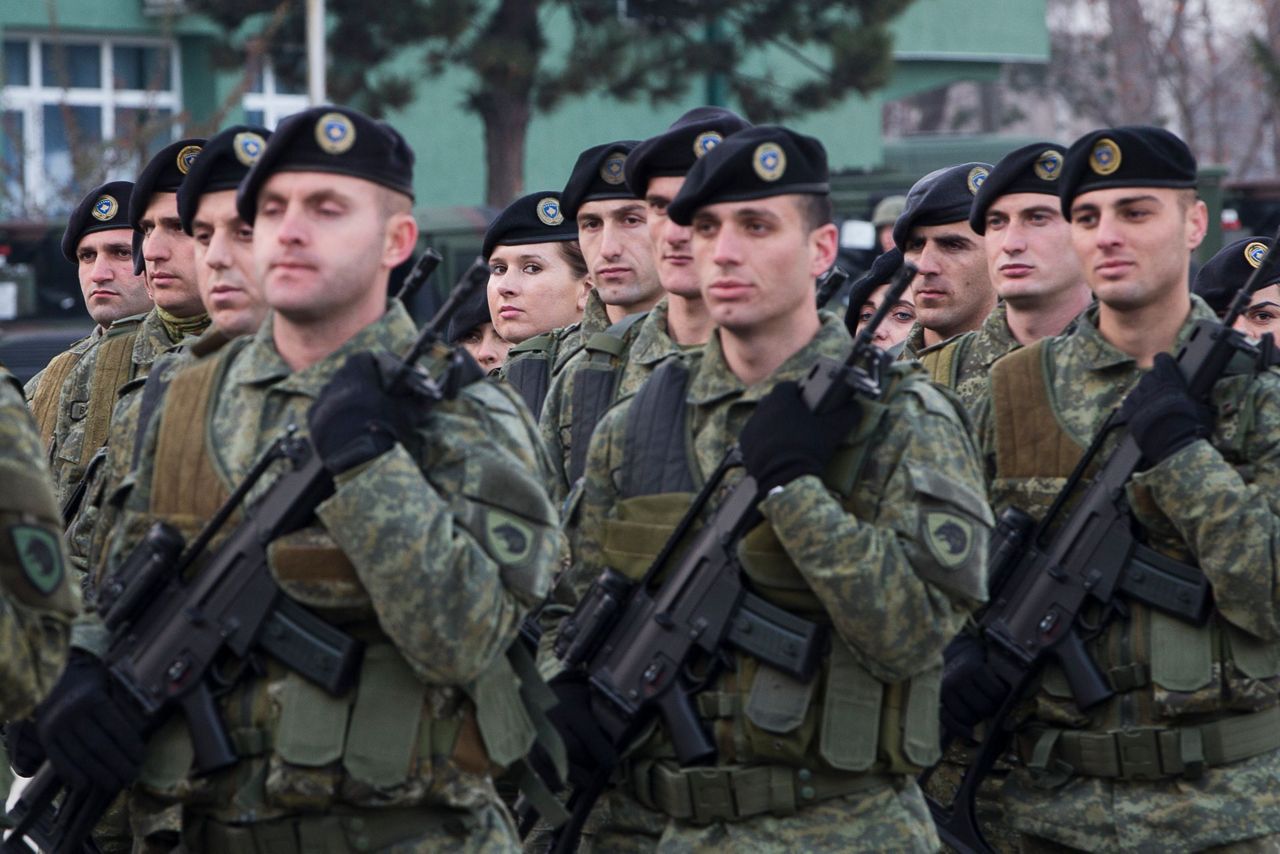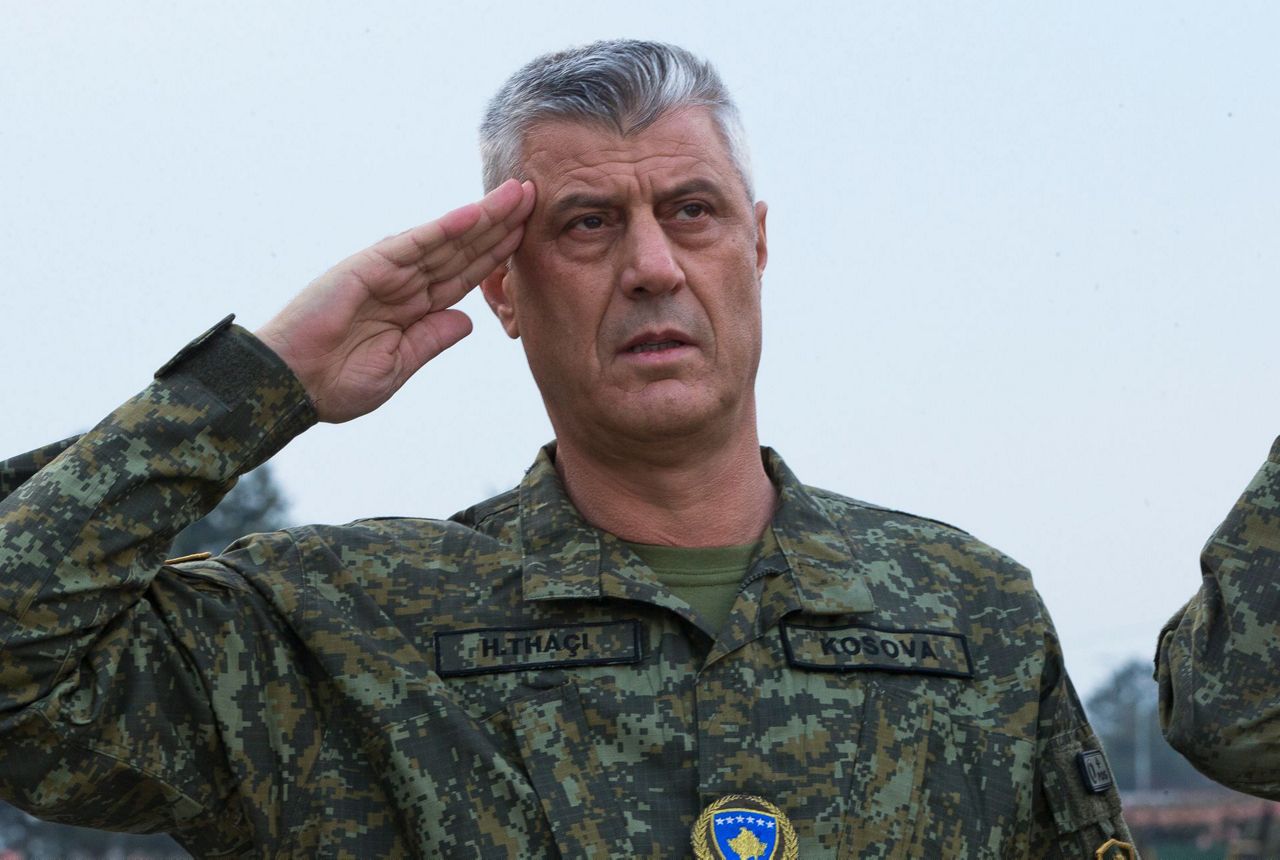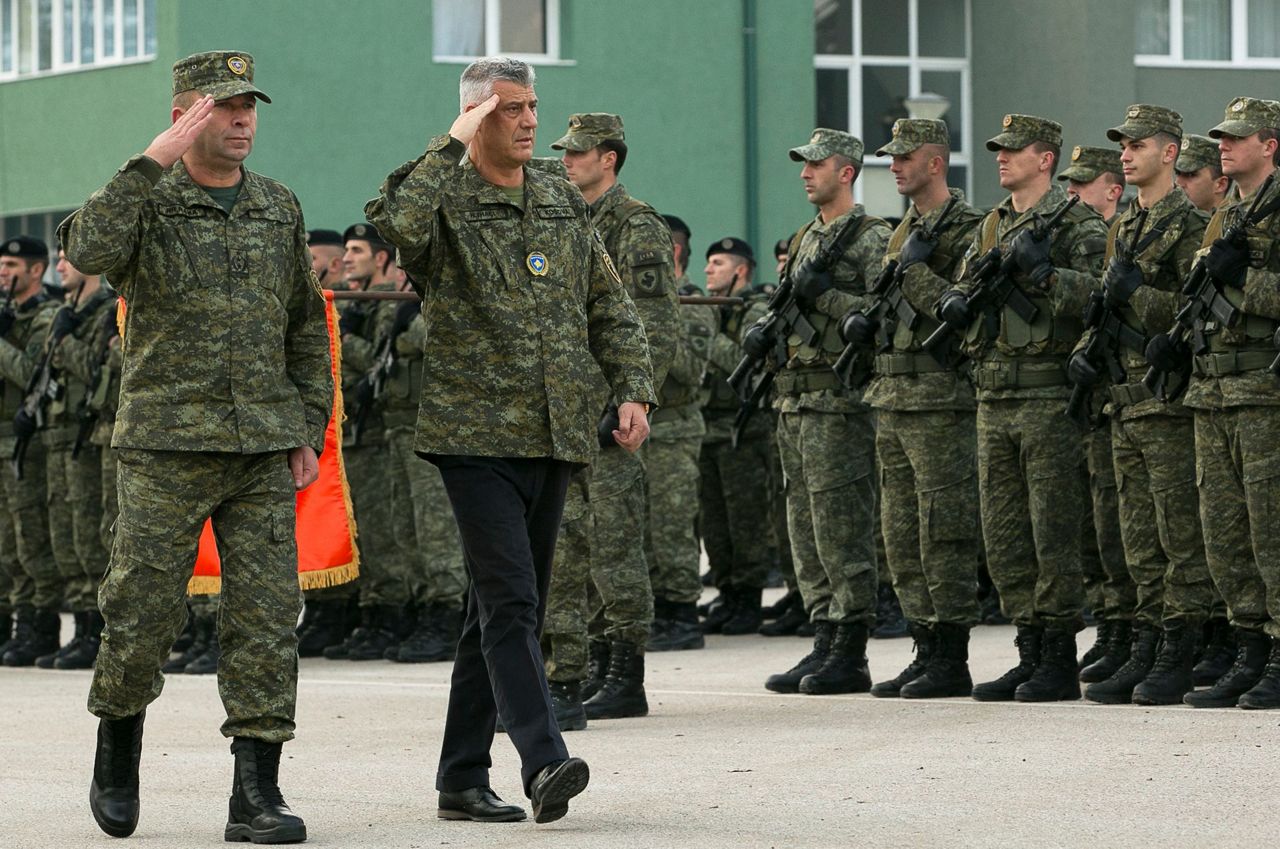PRISTINA, Kosovo (AP) — The Latest on Kosovo's vote to create an army (all times local):
2:40 p.m.
Serbia's foreign minister says the country will seek an urgent session of the U.N. Security Council over Kosovo's decision to form an army.
Serbia maintains the vote in Kosovo's parliament was in violation of a U.N. resolution on Kosovo brought at the end of the 1998-99 war and NATO's military intervention against Serbia.
NATO bombed Serbia for 78 days in 1999 to stop its crackdown against Kosovo separatists. Kosovo declared independence in 2008, which Serbia doesn't recognize.
Serbia Foreign Minister Ivica Dacic has described the Kosovo army formation as "the most direct threat to peace and stability in the region and to security of the Serbian people."
Kosovo has had Western support while Serbia has relied on Russia and China in its bid to retain its claim over its former territory.
___
1:40 p.m.
Serbia says it considers Kosovo's new army an "illegal, occupational armed formation" and warned that any Serbs in Kosovo who join the force would face legal action.
Government official Marko Djuric said Friday that Kosovo parliament's decision Friday to form the army is a violation of international agreements that ended Kosovo's 1998-99 war.
Djuric says Serbia is demanding that NATO peacekeepers in Kosovo prevent any action by the Kosovo army and disarm its troops. He reiterated that Serbia could declare Kosovo an occupied territory and approve the use of Serbian armed forces.
Kosovo's leaders have sought to reassure Serbia that the army does not threaten peace in the region.
"Kosovo's army will never be used against them (Serbs)," Prime Minister Ramush Haradinaj said.
President Hashim Thaci said that the new army will be "multiethnic, professional and to serve all citizens, peace in Kosovo, the region and wherever in the world when asked."
___
1:30 p.m.
The European Union's foreign policy chief has expressed regret over Kosovo's move to form a new army.
A statement Friday from Federica Mogherini's office said the EU was in agreement with NATO that the mandate of Kosovo's current security force "should only be changed through an inclusive and gradual process in accordance with Kosovo Constitution."
NATO Secretary-General Jens Stoltenberg also regretted Pristina's move as "ill-timed" and that the start of the army transition "was made despite the concerns expressed by NATO."
Mogherini leads seven-year long talks between Pristina and Belgrade to normalize their ties. Brussels has said that is fundamental in their further integration process into the bloc.
___
12:55 p.m.
Politicians in Serb-dominated northern Kosovo say they don't recognize the formation of Kosovo's army and that it presents "a shot into peace."
Serb leader Goran Rakic said Friday Kosovo's military is "unacceptable for us and we absolutely reject it and our message is that it has no validity."
Serb lawmakers boycotted the vote on forming the army in the Kosovo parliament on Friday. Rakic says the vote "showed clearly that Pristina does not want peace."
Rakic urged Serbs in Kosovo to show "restraint and not respond to provocations." He insists that "our interest is to maintain peace in this area."
Serbia doesn't recognize the 2008 Kosovo declaration of independence. Belgrade maintains strong influence among the Serbs in northern Kosovo, bordering Serbia.
___
12:50 p.m.
An adviser to Serbia's president says possible reaction by Serbia to Kosovo's decision to form an army could include declaring the former province an occupied territory and the use of the Serbian armed forces.
Nikola Selakovic told Serbian state TV on Friday that such a move would present a "serious decision that could have long-term consequences." He said Serbia also could move to approve the use of armed forces over the issue.
Selakovic suggested both moves are among the options being contemplated by the Serbian government after Kosovo's parliament voted to formally set up the army. He said both decisions would need support from the government and parliament of Serbia.
Serbia insists that formation of the army is in violation of a U.N. resolution that ended the war in Kosovo after a NATO intervention.
Any Serbian armed intervention in Kosovo would mean a direct confrontation with about 4,500 NATO-led peacekeepers, including U.S. soldiers stationed in Kosovo.
___
12:35 p.m.
The NATO secretary-general says he regrets a Kosovo move to turn its security force into a regular army.
Jens Stoltenberg said in a statement that Friday's decision by Kosovo parliament to start the transition "was made despite the concerns expressed by NATO."
Stoltenberg says "the transition of the Kosovo Security Force is in principle a matter for Kosovo to decide, we have made clear that this move is ill-timed."
Stoltenberg says NATO supports the development of the Kosovo Security Force under its current mandate, but with its change the alliance "will now have to re-examine the level of NATO's engagement with the Kosovo Security Force."
He reiterated his call on both Pristina and Belgrade "to remain calm and refrain from any statements or actions which may lead to escalation."
NATO peacekeepers were deployed in Kosovo in 1999 when Serbia lost control of its former province after a bloody crackdown against ethnic Albanian separatists.
___
12:20 p.m.
Germany says a vote to approve the formation of a Kosovo army must not be used to escalate tensions in the region.
Kosovo's parliament on Friday approved the move, which has angered Serbia. German Foreign Ministry spokesman Rainer Breul said "Kosovo, as a sovereign state, has the right to create regular armed forces."
But he noted Berlin has always made clear that the transformation of the existing Kosovo Security Force "should not be overhasty, but an inclusive process involving the Kosovo Serb minority and in close consultation above all with NATO and the NATO allies."
Breul underlined the need for Kosovo and Serbia to normalize relations. He said: "We appeal to both sides to exert restraint. The approval of the laws must not be used as a pretext for further escalation."
___
12:10 p.m.
The United States has hailed Kosovo's parliamentary vote to form a new army as a first step and reaffirmed "its support for the gradual transition ... to a force with a territorial defense mandate, as is Kosovo's sovereign right."
Kosovo's parliament on Friday overwhelmingly approved the formation of an army, a move that has angered Serbia which says it would threaten peace in the war-scarred region.
A U.S. Embassy statement in Pristina urged Kosovo to continue "close coordination with NATO allies and partners and to engage in outreach to minority communities."
The statement also said "regional stability requires that Kosovo make genuine efforts to normalize relations with its neighbor Serbia, and we encourage both sides to take immediate steps to lower tensions and create conditions for rapid progress on dialogue."
___
11:50 a.m.
Serbia's prime minister says the formation of an army in Kosovo goes against efforts at stability in the volatile Balkans.
Ana Brnabic said Friday that "Serbia will try to continue on the path of peace and stability, the road of prosperity." Brnabic adds that "we should sit down and talk about building a better future."
"Today is not the day that contributes to cooperation and stability in the region," she added.
Serbia doesn't recognize Kosovo's 2008 declaration of independence and has been fiercely opposed to the formation of the Kosovo army, saying it threatens the Serb minority.
___
11:30 a.m.
Kosovo's parliament has overwhelmingly approved the formation of an army, a move that has angered Serbia which says it would threaten peace in the war-scarred region.
All 107 lawmakers present in the 120-seat parliament on Friday voted in favor of passing three draft laws to turn the existing 4,000-strong Kosovo Security Force into a regular, lightly armed army.
___
10 a.m.
Kosovo's parliament is convening to approve the formation of an army, a move that has angered Serbia which says it would threaten peace in the war-scarred region.
The 120-seat parliament on Friday will vote on three laws to turn an existing 4,000-member Kosovo Security Force into a regular lightly armed army. Ethnic Serb lawmakers were expected to boycott the vote.
Serbia fears the move's main purpose is to ethnically cleanse Kosovo's Serbian-dominated north, something strongly denied by Pristina.
Kosovo's 1998-199 war ended with a 78-day NATO air campaign in June 1999 that stopped a Serbian crackdown against ethnic Albanian separatists.
Kosovo's 2008 independence isn't recognized by Serbia.
Copyright 2018 The Associated Press. All rights reserved. This material may not be published, broadcast, rewritten or redistributed.






